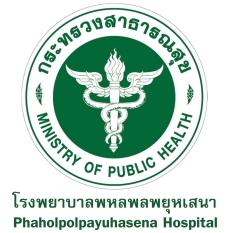The Prevalence and Associated Factors of Mental Health Problems among Healthcare Workers at Phaholpolpayuhasena Hospital, Kanchanaburi Province in the Post-COVID-19 Pandemic Era
Keywords:
mental health problems, healthcare workers, post-COVID-19 pandemic eraAbstract
Objectives: To study the prevalence and related factors of mental health problems among healthcare workers at Phaholpolpayuhasena Hospital, Kanchanaburi Province, in the post-COVID-19 pandemic era.
Methods: This was a cross-sectional descriptive study involving 373 healthcare workers from Phaholpolpayuhasena Hospital conducted from April 1, 2024, to May 31, 2024. The sample was selected using stratified sampling based on professional fields and by population size proportion (PPS). The research instrument was a self-administered questionnaire consisting of four sections: 1) personal factors, 2) work-related factors, 3) concerns about COVID-19, and 4) the Thai GHQ-28 mental health screening tool. Data were analyzed using frequency and percentage, with multiple logistic regression statistics to analyze factors related to mental health problems.
Results: A total of 373 questionnaires were completed, representing a response rate of 41.4%. The prevalence of mental health problems was 12.9%. The sample exhibited varying levels of concern regarding COVID-19, ranging from not worried at all to quietly not worry. Associated factors with mental health problems included insufficient income (aOR=2.39; 95%CI=1.14-5.01), working hours exceeding 56 hours per week (aOR=0.018; 95%CI=1.25-10.63), and having responsibilities for caring for COVID-19 patients (aOR=0.005; 95%CI=1.34-5.13).
Conclusions: The prevalence of mental health problems in this study was comparable to findings during the COVID-19 pandemic, although the level of concern among healthcare workers regarding COVID-19 has decreased since the outbreak.
References
Hui DS, I Azhar E, Madani TA, Ntoumi F, Kock R, Dar O, et al. The continuing 2019-nCoV epidemic threat of novel coronaviruses to global health - The latest 2019 novel coronavirus outbreak in Wuhan, China. International Journal of Infectious Diseases. 2020;91:264-6.
Cucinotta D, Vanelli M. WHO Declares COVID-19 a Pandemic. Acta bio-medica : Atenei Parmensis. 2020;91(1):157–60.
Pfizer Inc. Global and U.S. Agencies Declare End of COVID-19 Emergency [Internet]. Pfizer. 2023 [cited 2024 Jul 26]. Available from: https://www.pfizer.com/news/announcements/
global-and-us-agencies-declare-end-covid-19-emergency
Wipatayotin A, Bangprapa M. “Post-pandemic Day” edges near. Bangkok Post [Internet]. 2022 Jun 28 [cited 2024 Jul 26]; Available from: https://www.bangkokpost.com/thailand/general/2334988/post-pandemic-day-edges-near.
กระทรวงสาธารณสุข. DDC COVID-19 Interactive Dashboard [อินเทอร์เน็ต]. 2567 [เข้าถึงเมื่อ 26 ก.ค. 2567]. เข้าถึงได้จาก: https://ddc.moph.go.th/covid19dashboard/?dashboard=main
กระทรวงสาธารณสุข กรมควบคุมโรค [Internet]. วัคซีนโควิด 19. 2024 [เข้าถึงเมื่อ 26 ก.ค. 2567]. เข้าถึงได้จาก: https://ddc.moph.go.th/vaccine-covid19/pages
Dai Y, Hu G, Xiong H, Qiu H, Yuan X. Psychological impact of the coronavirus disease 2019 (COVID-19) outbreak on healthcare workers in China [Internet]. 2020 [cited 2024 Jul 26]. Available from: http://dx.doi.org/10.1101/2020.03.03.20030874
Du J, Dong L, Wang T, Yuan C, Fu R, Zhang L, et al. Psychological symptoms among frontline healthcare workers during COVID-19 outbreak in Wuhan. General Hospital Psychiatry. 2020;67(1):144–5.
ศศิธรโยธะบุรี. ความชุกและปัจจัยที่เกี่ยวข้องกับสุขภาพจิตของบุคลากรโรงพยาบาลมหาสารคาม. วารสารโรงพยาบาลสารคาม. 2565;19(3):149-64.
Konradsen H, Brødsgaard A, Østergaard B, García-Vivar C, Svavarsdottir EK, Dieperink KB, et al. The COVID-19 Post Pandemic: Family Nursing Now More Than Ever. Journal of Family Nursing. 2023;29(1):3–5.
Liang Z, Wang Y, Wei X, Wen W, Ma J, Wu J, et al. Prevalence and associated factors of depressive and anxiety symptoms among healthcare workers in the post-pandemic era of COVID-19 at a tertiary hospital in Shenzhen, China: A cross-sectional study. Frontiers in Public Health. 2023;11:1094776.
Nilchaikovit T, Sukying C, and Silpakit C. Reliability and Validity of the Thai Version of the General Health Questionnaire. Journal of the Psychiatric Association of Thailand. Journal of the Psychiatrist Association of Thailand. 1996;41:2-17.
กนกฉัตร กาญจนนิตย์. ความชุกและปัจจัยที่เกี่ยวข้องกับปัญหาทางสุขภาพจิตของบุคลากรทางการแพทย์โรงพยาบาลเวียงป่าเป้า จ.เชียงราย ระหว่างการแพร่ระบาดของโรคติดเชื้อไวรัสโคโรนา 2019 (โควิด-19). วารสารระบบบริการปฐมภูมิและเวชศาสตร์ครอบครัว. 2566;6(3):218-27.
Konradsen H, Brødsgaard A, Østergaard B, García-Vivar C, Svavarsdottir EK, Dieperink KB, et al. The COVID-19 Post Pandemic: Family Nursing Now More Than Ever. Journal of family nursing. 2023;29(1):3–5.
วิศิษฎ์ เนติโรจนกุล. ความชุกและปัจจัยที่เกี่ยวข้องของปัญหาทางสุขภาพจิตของบุคลากรทางการแพทย์โรงพยาบาลนครปฐม ในยุคการระบาดของโรคติดเชื้อไวรัสโคโรนา 2019 (โควิด-19). วารสารแพทย์เขต 4-5. 2563:39(4):616-27.
Yao Y, Tian Y, Zhou J, Diao X, Cao B, Pan S, et al. Psychological Status and Influencing Factors of Hospital Medical Staff During the COVID-19 Outbreak. Frontiers in psychology. 2020;11(1):1841.
Kisely S, Warren N, McMahon L, Dalais C, Henry I, Siskind D. Occurrence, prevention, and management of the psychological effects of emerging virus outbreaks on healthcare workers: rapid review and meta-analysis. BMJ. 2020;369:m1642.
Motahedi S, Aghdam NF, Khajeh M, Baha R, Aliyari R, Bagheri H, et al. Anxiety and depression among healthcare workers during COVID-19 pandemic: A cross-sectional study. Heliyon. 2021;7(12):e08570.
Downloads
Published
How to Cite
Issue
Section
License
Copyright (c) 2024 Phaholpolpayuhasena Hospital

This work is licensed under a Creative Commons Attribution-NonCommercial-NoDerivatives 4.0 International License.
บทความที่ได้รับการตีพิมพ์เป็นลิขสิทธิ์ของโรงพยาบาลพหลพลพยุหเสนา
ข้อความที่ปรากฏในบทความแต่ละเรื่องในวารสารวิชาการเล่มนี้เป็นความคิดเห็นส่วนตัวของผู้เขียนแต่ละท่านไม่เกี่ยวข้องกับโรงพยาบาลพหลพลพยุหเสนาและบุคลากรท่านอื่น ๆ ในโรงพยาบาลฯ แต่อย่างใด ความรับผิดชอบองค์ประกอบทั้งหมดของบทความแต่ละเรื่องเป็นของผู้เขียนแต่ละท่าน หากมีความผิดพลาดใด ๆ ผู้เขียนแต่ละท่านจะรับผิดชอบบทความของตนเอง



 Phaholpolpayuhasena Hospital
Phaholpolpayuhasena Hospital
